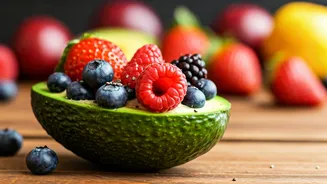Oats and Barley
Oats and barley, often underestimated, are powerhouses when it comes to reducing cholesterol. They contain soluble fiber, a type of fiber that binds with
cholesterol in the digestive system and prevents its absorption. Studies have shown that consuming just 1.5 grams of soluble fiber from oats daily can reduce total cholesterol and LDL (bad) cholesterol. This is because soluble fiber forms a gel-like substance that traps cholesterol, leading to its excretion from the body. Incorporating oats and barley into your diet is simple. Start your day with a bowl of oatmeal, use barley in soups and stews, or even add oat bran to smoothies or baked goods. The key is consistency; regular consumption is essential to experience the benefits of these grains. They're not only effective but also versatile and easy to integrate into various meals. So, embrace these grains as a staple in your diet, and you'll be one step closer to lowering your cholesterol.
Beans and Legumes
Beans and legumes are another excellent source of soluble fiber, making them effective at lowering cholesterol levels. They come in various forms, including kidney beans, navy beans, lentils, and chickpeas. Similar to oats, the soluble fiber in beans binds with cholesterol in the digestive tract, aiding in its removal. Research indicates that incorporating beans into your diet can significantly reduce LDL cholesterol. Beans also offer a wealth of other nutrients, such as protein, iron, and folate, contributing to a balanced diet. Adding beans to your meals is straightforward. You can add them to salads, soups, stews, or even enjoy them as a side dish. Canned beans are convenient, but rinsing them before use can reduce sodium intake. Experiment with different types of beans to find your favorites, and aim for at least a few servings per week. Regular consumption can have a positive impact on your cholesterol levels and overall health. They are an accessible and budget-friendly way to boost your heart health.
Fatty Fish Power
Fatty fish, such as salmon, mackerel, and tuna, are rich in omega-3 fatty acids, which have several heart-healthy benefits, including lowering triglycerides, a type of fat in the blood. While omega-3s don't directly lower LDL cholesterol, they contribute to overall cardiovascular health. The American Heart Association recommends eating at least two servings of fatty fish per week. Omega-3 fatty acids can also help to reduce inflammation, which can contribute to the development of heart disease. Preparing fatty fish is simple. Bake, grill, or pan-fry them with your favorite seasonings. If fresh fish is unavailable, canned fish, such as sardines or tuna, can be a convenient alternative, but opt for those packed in water. Omega-3 fatty acids also play a vital role in brain health and have been linked to improved mood and cognitive function. Incorporating fatty fish into your diet will give you multiple health benefits. It is a delicious way to support your heart and overall well-being.
Nuts and Seeds
Nuts and seeds, such as almonds, walnuts, flaxseeds, and chia seeds, are packed with healthy fats, fiber, and plant sterols, all of which contribute to lowering cholesterol levels. Plant sterols, in particular, block the absorption of cholesterol in the gut. Regularly eating nuts and seeds has been linked to a reduced risk of heart disease. However, it's essential to consume them in moderation, as they are calorie-dense. A handful of nuts or a tablespoon of seeds per day is a good starting point. You can add nuts and seeds to your salads, yogurt, oatmeal, or eat them as a snack. Opt for unsalted varieties to limit sodium intake. Nuts and seeds also provide vitamins, minerals, and antioxidants, further boosting their nutritional value. Choosing a variety of nuts and seeds will help you get a broader range of nutrients. Remember, the key is to incorporate these into a balanced diet to benefit from their cholesterol-lowing effects.
Plant Sterol Foods
Foods fortified with plant sterols and stanols are an effective way to lower cholesterol. Plant sterols are naturally found in plants, and they have a similar structure to cholesterol, allowing them to block the absorption of cholesterol in the digestive tract. Many food products, such as yogurt, orange juice, and margarine, are fortified with plant sterols. The daily recommendation is around 2 grams of plant sterols to achieve the desired effect. When choosing these products, read labels carefully to ensure that they contain the appropriate amount of plant sterols. Plant sterol-fortified foods are a convenient way to integrate these beneficial compounds into your diet. They are a good supplement to a diet that already includes cholesterol-lowering foods. They can be a part of your daily routine and make lowering cholesterol easier. Combined with the other foods mentioned, they can significantly impact your cholesterol levels and improve your heart health. They can be a beneficial addition to your daily intake.



















